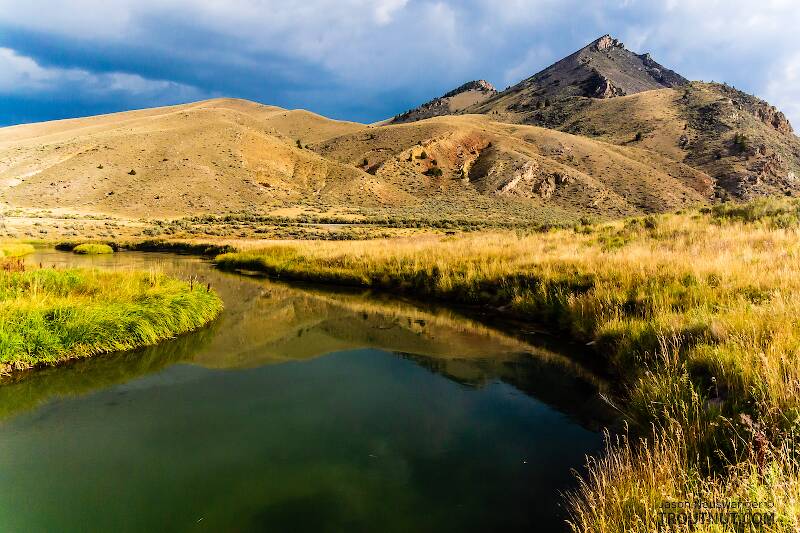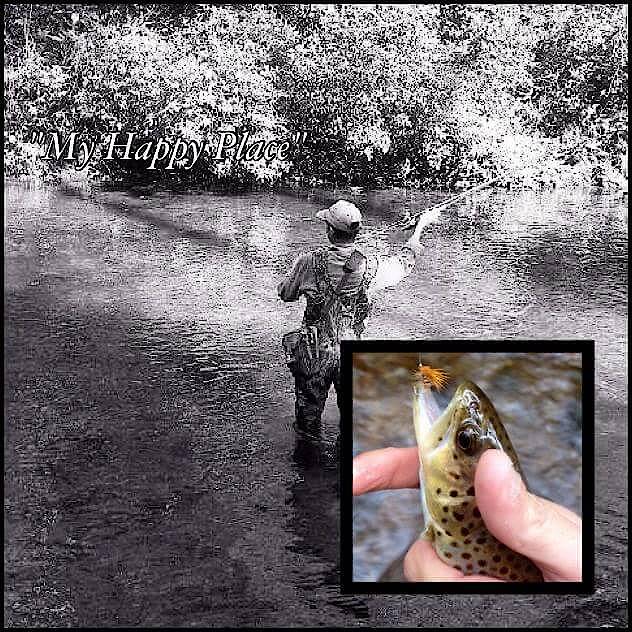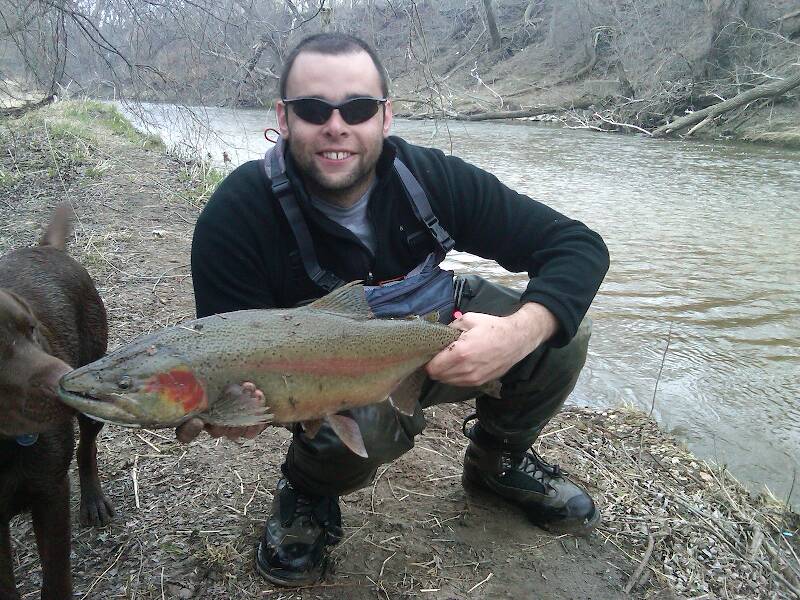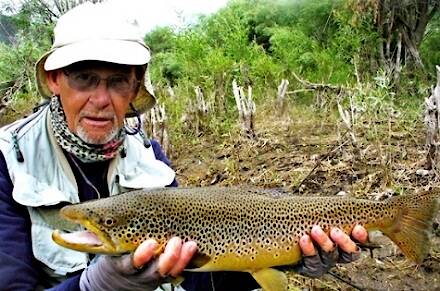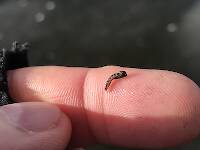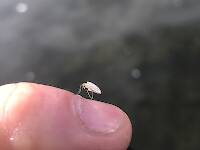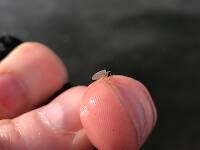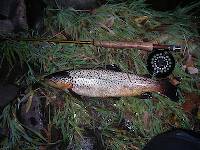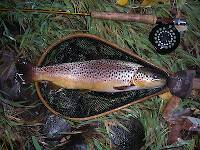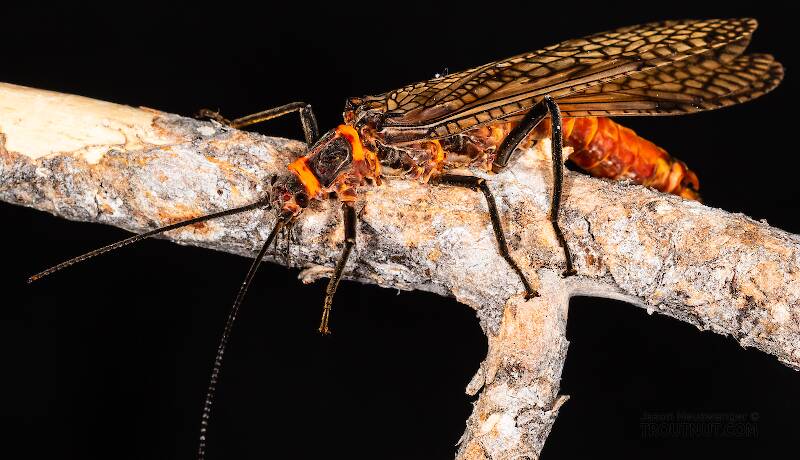
Salmonflies
Pteronarcys californica
The giant Salmonflies of the Western mountains are legendary for their proclivity to elicit consistent dry-fly action and ferocious strikes.
Featured on the forum
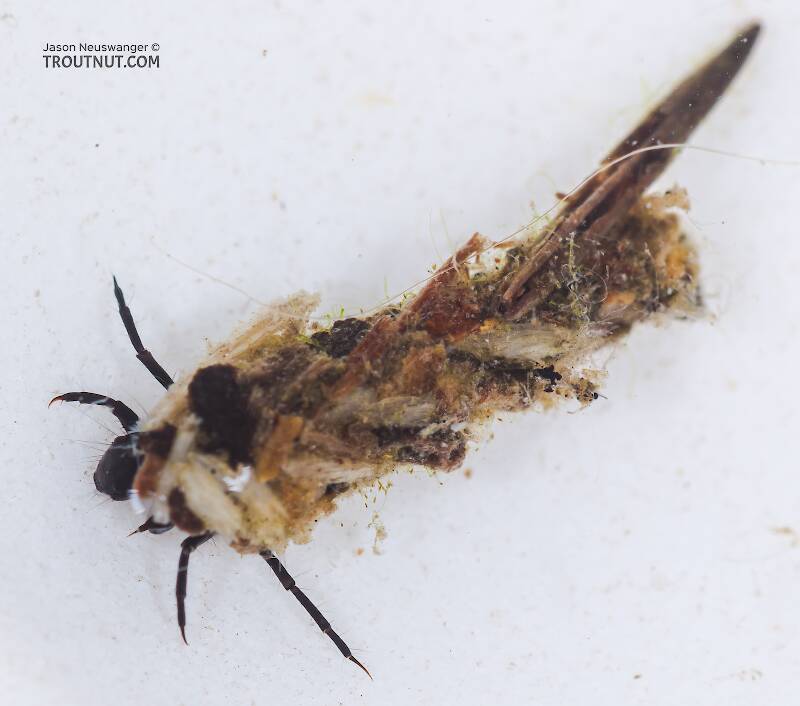
This seems to be a young larva of Limnephilus. Although not clear in the picture, several ventral abdominal segments have chloride epithelia.

Troutnut is a project started in 2003 by salmonid ecologist Jason "Troutnut" Neuswanger to help anglers and
fly tyers unabashedly embrace the entomological side of the sport. Learn more about Troutnut or
support the project for an enhanced experience here.
Justin483 on Jan 12, 2015January 12th, 2015, 4:48 am EST
Hey everyone, I'm brand new to Troutnut.com, BEST site around by the way. Anyways, I'm not entirely new to Fly Fishing, but unlike a lot of others I didn't grow up doing it. Most everything about Fly Fishing is falling into place with me. I've picked it up really quick about a year or so ago. But one thing I can't seem to get down is "Matching the Hatch" in my local Stream. Most times when I go I'm guessing blindly on what Fly to use. Yeah, it gets frustrating. Lol. I know about a lot of the tips and tricks, looking under rocks, spider webs, ect, but I hardly EVER find any insect activity. Are there any other tips, tricks, advise, and so on that anyone else has out there for me about MACHINE THE HATCH??
Winter has been a disaster season for me so far and I'm really hoping to improve my game. Thank you so much for reading this and taking your time to help a "new comer" enthusiast. Trout fishing is LIFE!!!
Winter has been a disaster season for me so far and I'm really hoping to improve my game. Thank you so much for reading this and taking your time to help a "new comer" enthusiast. Trout fishing is LIFE!!!
Feathers5
Posts: 287
Posts: 287
Feathers5 on Jan 12, 2015January 12th, 2015, 5:26 am EST
Welcome to the site. There are many experts here to help, but I'm not one of them.
The first best thing you should do is visit a fly shop that serves the water you will be fishing. Look for stream reports, and people that regulary fish the water, for info on bugs, hatches, and flies. Tell them you are not trying to find out their hot sposts, just a little about what flies might work.
Take some sharp, macro photographs of the bugs in question, and load them on to this site. We have some well-edgeykated entomologists here that are free with their bug knowledge.
Read. Some people read too much, but learning about local waters will help you.
The first best thing you should do is visit a fly shop that serves the water you will be fishing. Look for stream reports, and people that regulary fish the water, for info on bugs, hatches, and flies. Tell them you are not trying to find out their hot sposts, just a little about what flies might work.
Take some sharp, macro photographs of the bugs in question, and load them on to this site. We have some well-edgeykated entomologists here that are free with their bug knowledge.
Read. Some people read too much, but learning about local waters will help you.
Justin483 on Jan 12, 2015January 12th, 2015, 5:53 am EST
Big thanks, sounds like a start to a good plan. If I can find the bugs I'll be loading the pictures on this page immediately. I know it shouldn't be, but asking the local shop stuff like this over and over and over again can be down right embarrassing. I'm always asking what the Trout have been feeding on. Honestly even when I do that I'm still getting skunked, because by the time I make it to the water things could be so different ya know. Insect activity can change from hour to hour. Maybe what I need to do is actually find someone more specific to this area. Lolol. Thanks again.
Kschaefer3 on Jan 12, 2015January 12th, 2015, 7:04 am EST
Big thanks, sounds like a start to a good plan. If I can find the bugs I'll be loading the pictures on this page immediately. I know it shouldn't be, but asking the local shop stuff like this over and over and over again can be down right embarrassing. I'm always asking what the Trout have been feeding on. Honestly even when I do that I'm still getting skunked, because by the time I make it to the water things could be so different ya know. Insect activity can change from hour to hour. Maybe what I need to do is actually find someone more specific to this area. Lolol. Thanks again.
It sounds to me like your issue is not matching the hatch, but finding the hatch. If you are not seeing bugs in the air or on the water, and no fish are rising, you probably aren't finding the hatch. My suggestion, especially in the winter, would be to nymph fish. I would fish a #16 pheasant tail trailed by a #20 beatis nymph on any trout stream in the country. I may have a biased opinion as that combo will catch fish 365 days a year in the spring creeks I fish.
Kschaefer3 on Jan 12, 2015January 12th, 2015, 7:06 am EST
Also, have you looked at this: http://goldrushtu.org/ga-hatch-chart/
That would help with what types of bugs could be hatching.
That would help with what types of bugs could be hatching.
Justin483 on Jan 12, 2015January 12th, 2015, 7:30 am EST
No, I sure haven't. Gonna do it right now though. Thanks a million.
Justin483 on Jan 12, 2015January 12th, 2015, 8:47 am EST
Great looking Hatch Chart. It's the third one I've saved. Lolol. This one has a few differences and I like the clickable fly pictures.
Kschaefer3 on Jan 12, 2015January 12th, 2015, 8:55 am EST
While this hatch chart will help know which bugs may be around and how to imitate them, you still need to get lucky and be on the water when something is hatching. That will be much easier in the warmer months, although matching the hatch usually gets trickier. What are the daytime highs like down there? Are you fishing tailwaters, or freestones?
Justin483 on Jan 12, 2015January 12th, 2015, 10:34 am EST
Okay, understandable. Please forgive me, some terminology escapes me even if I used to know them. Lol. What are tail waters and freestones? Are tail waters by dams? My local Stream is the Public Access Soque River. As in not the private sections. It's mostly rock, gravel, sand, and silt. Actually a lot of rocks and riffles. Mostly pretty steady moving water, but some slack sections you could get away throwing a light Catskill and Griffiths Gnat without a problem. Average depth is 1 foot to 3 foot. With some deeper holes thrown in the mix.
In the dead of winter time the average high temp is roughly 40°. Give or take. Average high in the Summer is 90°-92°ish. Lol.
Thanks so much for helping me again.
In the dead of winter time the average high temp is roughly 40°. Give or take. Average high in the Summer is 90°-92°ish. Lol.
Thanks so much for helping me again.
Wbranch on Jan 12, 2015January 12th, 2015, 11:48 am EST
Hello Justin,
Here is one hatch chart I found for north Georgia and southern South Carolina. It looks pretty extensive to me. It lists the actual insect and then in one of the right hand columns it appears to list flies that imitate that specific insect.
Edit: I opened this link and IMO the flies the writer recommends to "match" the insects listed are pretty lame. There are a few like the Hares Ear and Prince nymph that are generic attractor flies will work almost everywhere. But many of the dry flies recommended are not at all good representations of the living insect.
I freestone stream (not a scientific definition) is one that typically has very little aquatic vegetation in it and lots of boulders, rocks, and gravel on the bottom. Typically, but not always, freestone streams have flows, and water temperature, that fluctuate wildly based on snow melt, rain, cold weather, hot weather, they get most of there base flows from smaller tributaries and creeks that flow into the larger stream or river.
Tailwaters are named such because at some point up river there is a damn that is holding back water from a large lake or reservoir. Depending on the depth of the lake or reservoir, and if the release is from the bottom or the top of the damn, the flow and water temperatures are controlled much more closely than on a freestone water that is plagued with the variables of cold winters, hot summers, too much snow or rain, not enough snow or rain etc.
The quality of fishing is generally better and more consistent in a tail water than on a freestone. The hatches are much better because the water temperature in the spring, summer, and fall rarely is less than 48 degrees or greater than 60 degrees near the release point from the reservoir. If the reservoir, or lake, is deep the water down near the bottom is going to be very cold and when it is released form the bottom it will keep the river below the entry point cold for many miles downstream. Whereas a freestone river can only depend on the springs and little cold water creeks that enter it to manage the temperature of the water. In the summer that is the reason why many trout streams get low and the water warms up to the low 70's and greater while the water in the tailwater is always getting cold due to the bottom release.
I know there is a correlation of PH levels of alkalinity and acidity regarding freestone rivers, tail waters, and spring creeks (BTW spring creeks are not tailwaters but distinctly different than freestones) but I don't know the data regarding that aspect of my answer. I only know that if I had my choice I would only fish tailwaters, or spring creeks, because the emerging mayfly season, and the resultant better fishing is far better, and much more consistent than on freestones.
Here is one hatch chart I found for north Georgia and southern South Carolina. It looks pretty extensive to me. It lists the actual insect and then in one of the right hand columns it appears to list flies that imitate that specific insect.
http://www.ngatu692.com/Hatch_Chart/All_Year.htm
Edit: I opened this link and IMO the flies the writer recommends to "match" the insects listed are pretty lame. There are a few like the Hares Ear and Prince nymph that are generic attractor flies will work almost everywhere. But many of the dry flies recommended are not at all good representations of the living insect.
I freestone stream (not a scientific definition) is one that typically has very little aquatic vegetation in it and lots of boulders, rocks, and gravel on the bottom. Typically, but not always, freestone streams have flows, and water temperature, that fluctuate wildly based on snow melt, rain, cold weather, hot weather, they get most of there base flows from smaller tributaries and creeks that flow into the larger stream or river.
Tailwaters are named such because at some point up river there is a damn that is holding back water from a large lake or reservoir. Depending on the depth of the lake or reservoir, and if the release is from the bottom or the top of the damn, the flow and water temperatures are controlled much more closely than on a freestone water that is plagued with the variables of cold winters, hot summers, too much snow or rain, not enough snow or rain etc.
The quality of fishing is generally better and more consistent in a tail water than on a freestone. The hatches are much better because the water temperature in the spring, summer, and fall rarely is less than 48 degrees or greater than 60 degrees near the release point from the reservoir. If the reservoir, or lake, is deep the water down near the bottom is going to be very cold and when it is released form the bottom it will keep the river below the entry point cold for many miles downstream. Whereas a freestone river can only depend on the springs and little cold water creeks that enter it to manage the temperature of the water. In the summer that is the reason why many trout streams get low and the water warms up to the low 70's and greater while the water in the tailwater is always getting cold due to the bottom release.
I know there is a correlation of PH levels of alkalinity and acidity regarding freestone rivers, tail waters, and spring creeks (BTW spring creeks are not tailwaters but distinctly different than freestones) but I don't know the data regarding that aspect of my answer. I only know that if I had my choice I would only fish tailwaters, or spring creeks, because the emerging mayfly season, and the resultant better fishing is far better, and much more consistent than on freestones.
Catskill fly fisher for fifty-five years.
Wbranch on Jan 12, 2015January 12th, 2015, 12:04 pm EST
Justin,
As Kyle mentioned in the winter there is virtually no mayfly hatching activity. In my experience, based primarily on rivers in the Catskills of New York, it is very rare to see any mayflies emerging before the water temperature is at least 48 - 52 degrees for a number of consecutive days.
Midges however hatch (emerge) often in the dead of winter as long as there is some sun on the water. There are entomologists on this forum that can provide more scientific data but I'm thinking that midges can hatch in water that is much colder than mayflies hatch in. I don't fish for trout in the winter very often but when I do I would probably use two flies. One would be either a #16 bead head Pheasant tail nymph, or a Prince, and the other would be a simple black midge on a #18 - #20 scud hook. The midge I especially like has a little clear plastic bead, just a black thread body ribbed with XF silver or gold wire and a little black fur thorax. You fish this combo with enough weight to get the fly onto the bottom and fish it with a drag free float and if trout are present you should catch a couple.
In this river you fish have you ever turned over the rocks in the bottom to see what kind of aquatic insects are present? Doing this would be invaluable to increasing your knowledge of the river you fish. Then you can tie or buy flies that imitate the insects you find.
As Kyle mentioned in the winter there is virtually no mayfly hatching activity. In my experience, based primarily on rivers in the Catskills of New York, it is very rare to see any mayflies emerging before the water temperature is at least 48 - 52 degrees for a number of consecutive days.
Midges however hatch (emerge) often in the dead of winter as long as there is some sun on the water. There are entomologists on this forum that can provide more scientific data but I'm thinking that midges can hatch in water that is much colder than mayflies hatch in. I don't fish for trout in the winter very often but when I do I would probably use two flies. One would be either a #16 bead head Pheasant tail nymph, or a Prince, and the other would be a simple black midge on a #18 - #20 scud hook. The midge I especially like has a little clear plastic bead, just a black thread body ribbed with XF silver or gold wire and a little black fur thorax. You fish this combo with enough weight to get the fly onto the bottom and fish it with a drag free float and if trout are present you should catch a couple.
In this river you fish have you ever turned over the rocks in the bottom to see what kind of aquatic insects are present? Doing this would be invaluable to increasing your knowledge of the river you fish. Then you can tie or buy flies that imitate the insects you find.
Catskill fly fisher for fifty-five years.
Kschaefer3 on Jan 12, 2015January 12th, 2015, 12:18 pm EST
There are entomologists on this forum that can provide more scientific data but I'm thinking that midges can hatch in water that is much colder than mayflies hatch in.
In this river you fish have you ever turned over the rocks in the bottom to see what kind of aquatic insects are present? Doing this would be invaluable to increasing your knowledge of the river you fish. Then you can tie or buy flies that imitate the insects you find.
I am no entomologist, but I have seen midges emerging when the air temp is near 0. Sometimes the emergence can be surprisingly heavy in that cold of weather.
If midges are present in the river you fish, I would go with the midge dropper on your nymph rig like Wbranch mentioned, as opposed to the beatis I originally suggested. When I posted that, I was unsure of the distribution of midges.
Justin483 on Jan 12, 2015January 12th, 2015, 12:26 pm EST
To: York and Starlite. Wow, can't thank you enough for the amount of detail you've given me and explaining things to me. Also, thanks for looking up the hatch chart. I'll be checking it out as soon as I'm through with this. I was right about the Tailwaters, I just didn't know the extent behind it as you mentioned. Also, I believe when whoever coined the phrase or definition of a "Freestone" Stream they were going by the Soque River here in North Georgia. Several streams run into it and it is spring fed. LOL. That is SPOT ON.
Thank you again for the education and the time you've given me.
Thank you again for the education and the time you've given me.
Justin483 on Jan 12, 2015January 12th, 2015, 12:30 pm EST
Thank you also for the tips about the Flys to use. Sometimes I think I'm over thinking my selection and I spend most my time rigging and rerigging. I've heard from several people that the smaller thread Abdomen black midge as you described is a definite winner. So you've with this helped me make up my mind on selection and I'm just gonna start concentrating on my presentations. I'm a Fly Tyer myself, I tie mostly impressionistics. I fish for them opertunistic trout. I LOVE the Pheasant Tail Nymph and the Hares Ear. Can't beat em.
Wbranch on Jan 12, 2015January 12th, 2015, 12:42 pm EST
Justin,
I Googled "Soque River" and see that there are many private lodges on it that stock huge brown and rainbow trout. I just wanted to mention to you that those monster trout are not indicative of the sixe of the trout you would normally catch in a stream the size or the Soque. The number and size of the fish I saw that would be measured in pounds rather than inches is unrealistic in regard to the size of the trout that I'm venture to guess every guy, and gal, on this forum catches.
I think I catch a lot of big trout yet after seeing the pictures of the monsters caught at those many lodges only a few of my trout could be compared to those brutes.
I also read that public access is quite difficult. I'm assuming you enter he stream on a public access area. About how much stream is public? A mile, and couple of miles? I wonder if any of those steroid trout move out of the private water and go into the public water. I would venture to guess that the owners of the various private water sections augment the natural food found in the stream with the pellet food that is feed to hatchery fish that is the only way that they can sustain the girth and weight they have as it surely isn't coming from insect life in the stream.
BTW my name is Wbranch - York and Starlight is where I live.
I Googled "Soque River" and see that there are many private lodges on it that stock huge brown and rainbow trout. I just wanted to mention to you that those monster trout are not indicative of the sixe of the trout you would normally catch in a stream the size or the Soque. The number and size of the fish I saw that would be measured in pounds rather than inches is unrealistic in regard to the size of the trout that I'm venture to guess every guy, and gal, on this forum catches.
I think I catch a lot of big trout yet after seeing the pictures of the monsters caught at those many lodges only a few of my trout could be compared to those brutes.
I also read that public access is quite difficult. I'm assuming you enter he stream on a public access area. About how much stream is public? A mile, and couple of miles? I wonder if any of those steroid trout move out of the private water and go into the public water. I would venture to guess that the owners of the various private water sections augment the natural food found in the stream with the pellet food that is feed to hatchery fish that is the only way that they can sustain the girth and weight they have as it surely isn't coming from insect life in the stream.
BTW my name is Wbranch - York and Starlight is where I live.
Catskill fly fisher for fifty-five years.
Justin483 on Jan 12, 2015January 12th, 2015, 12:42 pm EST
Kshaefer3,
I sure have turned over countless rocks. Lol. And I've yet to come across any insect activity. It's the dangdest thing. But I catch em on Caddis, Caddis Pupa, PTN, Hares Ears, Griffiths Gnat,ect. So I KNOW there in the stream SOMEWHERE. LOL. And it seems common sense would tell me there is Midge Activity as well of course, cause I went out the other day and I was right in the middle of a Trout feeding frenzy. They were hitting something all around me from as close to three feet away. It was spooky......and down right frustrating too. Whatever they were feeding on I couldn't make it out to save my life. Couldn't see what it was. Afterwards I came to the conclusion that it had to of been something possibly emerging. I'm convinced about using a small black midge on a heavy dropper. Even a baetis like the WD-40 except in black would probably put a few fish in the net. I just have to have faith in the smaller stuff.
Thanks so much for helping. I love this page. Ya'll have really put a lot more confidence in my game. And with me that goes along ways.
I sure have turned over countless rocks. Lol. And I've yet to come across any insect activity. It's the dangdest thing. But I catch em on Caddis, Caddis Pupa, PTN, Hares Ears, Griffiths Gnat,ect. So I KNOW there in the stream SOMEWHERE. LOL. And it seems common sense would tell me there is Midge Activity as well of course, cause I went out the other day and I was right in the middle of a Trout feeding frenzy. They were hitting something all around me from as close to three feet away. It was spooky......and down right frustrating too. Whatever they were feeding on I couldn't make it out to save my life. Couldn't see what it was. Afterwards I came to the conclusion that it had to of been something possibly emerging. I'm convinced about using a small black midge on a heavy dropper. Even a baetis like the WD-40 except in black would probably put a few fish in the net. I just have to have faith in the smaller stuff.
Thanks so much for helping. I love this page. Ya'll have really put a lot more confidence in my game. And with me that goes along ways.
Wbranch on Jan 12, 2015January 12th, 2015, 12:54 pm EST
"I'm convinced about using a small black midge on a heavy dropper."
No, don't fish the midge on a heavy dropper. You want to use a tippet no heavier/stronger than 5X with a #18 or smaller fly. Also since you said you were "right in the middle of a Trout feeding frenzy" and weren't catching them I'd think there were midge pupa drifting in the water column. You might even want to fish two midge pupa, one behind the other. Again cast across the flow, with either no indicator, or the smallest indicator and let the flies drift drag free throughout a section of water. Personally I'd not even use an indicator. Since you saw fish rising I wouldn't use any split shot on the leader. Just cast across and let the weight of the hook sink the flies, and then follow the drift with your rod tip. The stream looks small enough that you can nymph it with very little fly line being used. Just get into a good riffle where you have already seen fish feeding and use a 9' tapered leader to 5X and extend maybe no more than 6' - 8' of fly line and flick the flies slightly up, and across the stream, and execute the drift. I bet you will catch a few fish.
No, don't fish the midge on a heavy dropper. You want to use a tippet no heavier/stronger than 5X with a #18 or smaller fly. Also since you said you were "right in the middle of a Trout feeding frenzy" and weren't catching them I'd think there were midge pupa drifting in the water column. You might even want to fish two midge pupa, one behind the other. Again cast across the flow, with either no indicator, or the smallest indicator and let the flies drift drag free throughout a section of water. Personally I'd not even use an indicator. Since you saw fish rising I wouldn't use any split shot on the leader. Just cast across and let the weight of the hook sink the flies, and then follow the drift with your rod tip. The stream looks small enough that you can nymph it with very little fly line being used. Just get into a good riffle where you have already seen fish feeding and use a 9' tapered leader to 5X and extend maybe no more than 6' - 8' of fly line and flick the flies slightly up, and across the stream, and execute the drift. I bet you will catch a few fish.
Catskill fly fisher for fifty-five years.
Justin483 on Jan 12, 2015January 12th, 2015, 1:12 pm EST
Again your spot on about the Soque. Yes, the private lodges stock major big fish there. In the Winter the public access portion DOES see some bigger fish. Actually much bigger fish. So I do suppose they venture our way some. But normal times like Summer the average fish is measured in inches not feet or pounds. 10"-16".
The most difficult part about the Public access is the crowds. But in its own it IS a somewhat difficult stream because of certain parts of the stream. Also the Public access is only 3/4 mile long. That's it.
You were right again about the pellets the private guys feed there trout too.
The most difficult part about the Public access is the crowds. But in its own it IS a somewhat difficult stream because of certain parts of the stream. Also the Public access is only 3/4 mile long. That's it.
You were right again about the pellets the private guys feed there trout too.
Justin483 on Jan 12, 2015January 12th, 2015, 1:19 pm EST
That makes perfect since!! Wish I would of thought of that at the time. Just seeing you write that out sounds like the way to go. I guess my mind was just going in a hundred different directions at the time.plus I'm not afraid to admit I'm not the most educated Fly Fisherman.....but I'm getting better and better every trip out.
I'm starting to think your playing with me and you LIVE ON THE SOQUE. LOL. Cause your right again, that's exactly what I do. I only let a few feet of Fly line out and use a 9'-10' 5x or 6x leader. I just flick them out there most times. Sometimes when Dry fishing I can get into a good long casting routine so not to spook fish. But like you said, it's a small river and that can be difficult.
Now are you dead set on the black midge with the clear bead? Anything else you'd suggest before I run that with the same midge except maybe in green or olive/brown?
I'm starting to think your playing with me and you LIVE ON THE SOQUE. LOL. Cause your right again, that's exactly what I do. I only let a few feet of Fly line out and use a 9'-10' 5x or 6x leader. I just flick them out there most times. Sometimes when Dry fishing I can get into a good long casting routine so not to spook fish. But like you said, it's a small river and that can be difficult.
Now are you dead set on the black midge with the clear bead? Anything else you'd suggest before I run that with the same midge except maybe in green or olive/brown?
Justin483 on Jan 12, 2015January 12th, 2015, 1:21 pm EST
/
| Thank you Wbranch. Sorry about the name mistake.
| Thank you Wbranch. Sorry about the name mistake.
Quick Reply
Related Discussions
Topic
Replies
Last Reply

